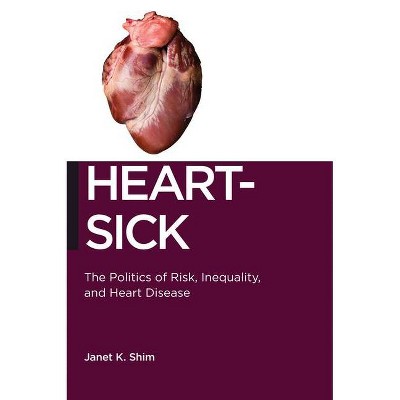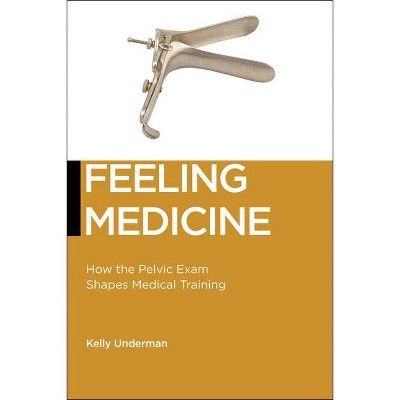Heart-Sick - (Biopolitics) by Janet K Shim (Paperback)

Similar Products
Products of same category from the store
AllProduct info
<p/><br></br><p><b> Book Synopsis </b></p></br></br>Heart disease, the leading cause of death in the United States, affects people from all walks of life, yet who lives and who dies from heart disease still depends on race, class, and gender. While scientists and clinicians understand and treat heart disease more effectively than ever before, and industrialized countries have made substantial investments in research and treatment over the past six decades, patterns of inequality persist. In <em>Heart-Sick</em>, Janet K. Shim argues that official accounts of cardiovascular health inequalities are unconvincing and inadequate, and that clinical and public health interventions grounded in these accounts ignore many critical causes of those inequalities. Examining the routine activities of epidemiology--grant applications, data collection, representations of research findings, and post-publication discussions of the interpretations and implications of study results--Shim shows how social differences of race, social class, and gender are upheld by the scientific community. She argues that such sites of expert knowledge routinely, yet often invisibly, make claims about how biological and cultural differences matter--claims that differ substantially from the lived experiences of individuals who themselves suffer from health problems. Based on firsthand research at epidemiologic conferences, conversations with epidemiologists, and in-depth interviews with people of color who live with heart disease, Shim explores how both scientists and lay people define "difference" and its consequences for health. Ultimately, <em>Heart-Sick</em> explores the deep rifts regarding the meanings and consequences of social difference for heart disease, and the changes that would be required to generate more convincing accounts of the significance of inequality for health and well-being.<p/><br></br><p><b> Review Quotes </b></p></br></br><br>In this cutting-edge book, Janet Shim meticulous unearths the inner logic of epidemiology to show how the familiar categories of race, gender, and class are inserted into medical knowledge in ways that strip them of social significance. Her fascinating interviews reveal a broad gulf between how experts conceive of the causes of health inequalities and how ordinary people caught in webs of social disadvantage understand what makes them sick. Heart-Sick takes a vexing and high-stakes questionWho gets sick and why?and sharply reframes it from a new vantage point.--Steven Epstein, author of Inclusion: The Politics of Difference in Medical Research<br><br>Janet Shim has produced a carefully crafted 'big picture' overview of the competing explanations of the incidence of heart disease. This is an important contribution to such disparate fields as epidemiology, the expanding literature in science studies, and sociological theories of race and class that attempt to account for health disparities.--Troy Duster, author, Backdoor to Eugenics<br><br>Shim made a very important contribution to understanding the culture of science, the diversity of 'knowledges' in a society, and multiplicity and intersectionality of social variables in the real lives of real people that must be included in science.-- "Anthropology Review"<br><br>This thought-provoking book will make everyone, and especially sociologists, think deeply about how to assess not only their own & risks but also the research on heart disease. It is a book that not only medical sociologists will find worthwhile, but also practitioners, as well as scholars who study the history of medicine and professions, science and technology, and the epidemiology of health and disease.-- "American Journal of Sociology"<br>
Price History
Price Archive shows prices from various stores, lets you see history and find the cheapest. There is no actual sale on the website. For all support, inquiry and suggestion messagescommunication@pricearchive.us




















